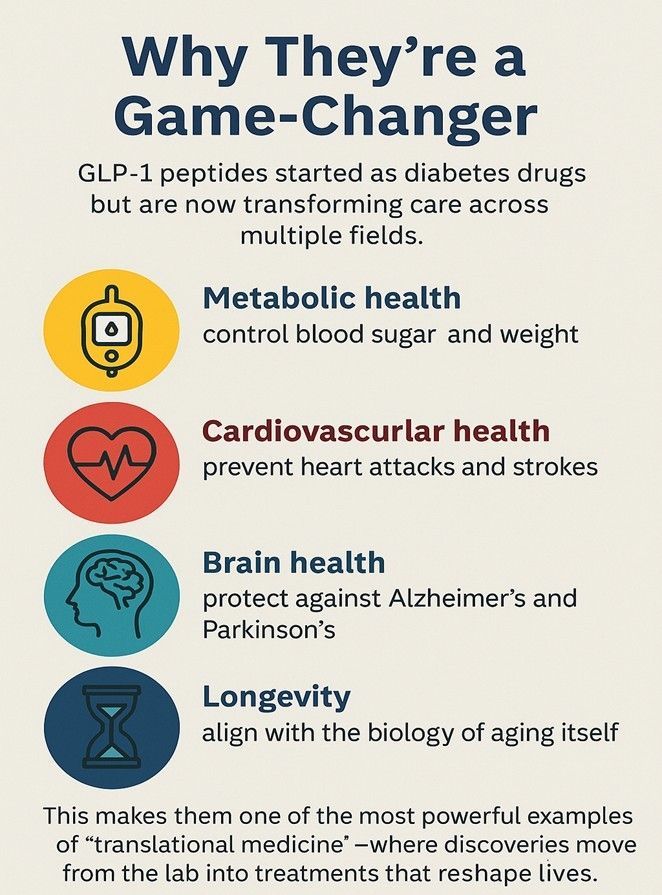The Future of Medicine: How GLP-1 Peptides Transform Metabolism and Brain Health
GLP-1 Peptides: A New Era for Healthy Aging and Weight Loss
Over the past decade, few medical breakthroughs have generated as much excitement as GLP-1 peptides. First developed to help manage type 2 diabetes, these therapies are now reshaping how we think about weight loss, heart health, brain protection, and even healthy aging.
So, what exactly are GLP-1 peptides, and why are they being called one of the most important tools in modern medicine? Let’s break it down.

What Are GLP-1 Peptides?
GLP-1 (short for
glucagon-like peptide-1) is a hormone naturally made in
the gut after eating. It plays several key roles:
- Boosting insulin release when blood sugar rises
- Reducing glucagon, a hormone that raises blood sugar
- Slowing digestion, so you feel full longer
- Promoting satiety, which reduces food intake
The problem? Natural GLP-1 breaks down in just a couple of minutes. Scientists solved
this by creating
GLP-1 receptor agonists (GLP-1RAs)—synthetic versions that last much
longer in the body. Today, options like
semaglutide, liraglutide, dulaglutide, and
tirzepatide can be given daily or weekly.
How Do They Work?
GLP-1 peptides act through special GLP-1 receptors, found not only in the pancreas but also in the gut, heart, kidneys, and brain. That’s why their effects go far beyond blood sugar.
Key Mechanisms:
- Metabolic: Stimulate insulin, protect pancreatic cells, suppress glucagon, and slow digestion.
- Cardiovascular & Renal: Lower blood pressure, improve circulation, protect kidneys.
- Neuroprotective: Cross into the brain to reduce inflammation, protect neurons, and support memory.
Clinical Benefits:
- Type 2 Diabetes
GLP-1RAs lower blood sugar as effectively as some insulins but without the same risk of hypoglycemia. They also preserve pancreatic function, which may slow disease progression. - Obesity & Weight Loss
GLP-1s are the first medications proven to produce sustained weight loss of 10–15% of body weight in large clinical trials. They work by reducing appetite and helping people feel full faster. - Cardiovascular Health
Major trials show GLP-1RAs reduce the risk of heart attack, stroke, and cardiovascular death—even in people without diabetes. - Kidney Protection
They slow the progression of diabetic kidney disease, reducing protein loss in urine and preserving kidney function. - Brain Protection
Exciting research suggests GLP-1s may reduce the risk of Alzheimer’s and Parkinson’s by lowering brain inflammation, improving nerve survival, and supporting cognitive function. Early studies even suggest benefits for mood and mental health. - Healthy Aging
Because they target obesity, inflammation, insulin resistance, and vascular damage—all hallmarks of aging—GLP-1 peptides may play a central role in extending healthspan, not just lifespan.
Safety and Side Effects:
While generally safe, GLP-1 therapy does require monitoring.
Common: nausea, vomiting, diarrhea, or constipation (usually improve over time).
Less common but important:
- Pancreatitis (rare, but caution in those with history)
- Gallbladder issues (like gallstones)
- Very rare thyroid C-cell tumors (seen in animals; not proven in humans, but caution if family history)
- Mild increase in heart rate
- Occasional reports of mood changes at high doses
Monitoring and Use:
Doctors typically start patients on a low dose and gradually increase to minimize stomach side effects.
Regular follow-up includes:
- Blood sugar & HbA1c every 3 months
- Weight, waist, blood pressure at visits
- Kidney and liver function every 6–12 months
- Monitoring for GI tolerance, gallbladder issues, or pancreatitis symptoms
Special consideration is needed for people with kidney disease, elderly patients, and women who are pregnant or breastfeeding (not recommended).
Final Takeaway
GLP-1 peptides are far more than just weight-loss drugs. They represent a
paradigm shift in medicine—addressing not only diabetes but also obesity, heart disease, kidney disease, neurodegeneration, and aging itself.
While they aren’t for everyone, with proper monitoring and expert guidance, GLP-1s can be integrated safely into long-term strategies for metabolic health, brain resilience, and healthy aging.
Call to Action: Take the Next Step with Confidia
At Confidia Health Institute, led by Dr. Kevin Greene, we are committed to helping patients harness the latest breakthroughs in science—including therapies like GLP-1 peptides—to achieve optimal health and longevity. Whether your goals are weight loss, metabolic balance, cardiovascular protection, or brain health, we provide precision care built on advanced testing and evidence-based therapies.
👉 Ready to explore whether GLP-1 therapy is right for you?
Contact Confidia Health Institute today to schedule a consultation with Dr. Kevin Greene and learn how personalized medicine can help you age healthier, stronger, and smarter.
